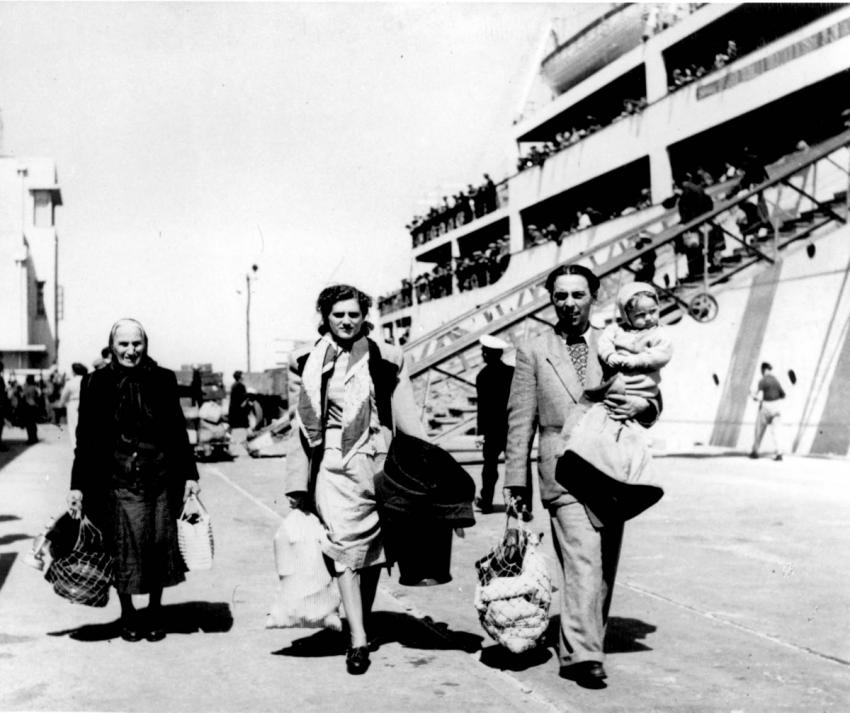After WWII, Garbash and her sisters returned to the Netherlands, in the hope of finding their parents, but they hadn’t survived and the young women decided to emigrate to Eretz Yisrael. Thousands of other Jews made the same decision, some from the mass movement known as the Bericha (escape) that propelled them to the shores of the Mediterranean. Their ultimate dream was to join the Jewish settlement and participate in the struggle for national independence. Orphaned teenagers from the camps and the forests and, together with women and children, partisans and soldiers in the armies who had fought the Nazis boarded ships to make their way clandestinely across the sea. When these “illegal immigrants” reached shore, they were immediately arrested by the British and placed - once again - behind barbed wire.
After the United Nations General Assembly resolution and the declaration of the Jewish State, the gates of the country opened and the immigrants longingly cast their eyes at the approaching shoreline and tasted oranges for the first time in their lives. Many young people rushed to join the defense forces, without asking for a moment of recuperation or quiet. They were among the dedicated fighters on several fronts, in breaking the siege on Jerusalem, in defending the Etzion Bloc, and everywhere else they were sent. Their comrades-in-arms quickly learned to appreciate their enthusiasm and dedication. In 1948, volunteers from Machal - overseas recruits - arrived, and joined the fighting units. By the second half of 1948, about half of all IDF combat soldiers were new immigrants. Many fell in battle, among them the last remnants of entire families.
With the birth of the young state, a new battle was set before the survivors: the struggle to make a living, build a home and establish a new family. Even living in tin huts, tents, immigrant and transit camps did not deter them. They strove for these goals relentlessly, out of a keen desire to become part of Israeli society, and took the initiatives required. The economic crisis, the deprivations of the Austerity Period, and the difficulties of learning Hebrew and assimilating into Israeli culture did not weaken their resolve: “During the first years, I wanted, like [many] survivors, to distance myself from my past. I wanted to be like the native-born Israelis, just to live the problems of the moment,” remembers Yad Vashem Academic Advisor Prof. Israel Gutman.
With no help and little governmental assistance, the survivors built their new lives. Clinging to their Jewish identity, they became active partners in the most important communal endeavor of the Jewish people of the 20th century - the establishment and development of the State of Israel.
The years passed, and the survivors lived through social, political and economic crises as well as times of great achievement. They became accomplished in every aspect of life: industry, science, art, literature and the media. In every field, their names are prominent. Most importantly, they were committed to commemoration: remembering their own families, their communities and each one of the six million Holocaust victims. They told stories of heroism, of the sanctification of life in the ghettoes and camps, and of armed combat. They described the last steps of those who collapsed on the death marches - on the very brink of liberation - and testified to the deeds of the few Righteous Among the Nations, a small ray of light amid the great darkness. They commemorated the story of the annihilated in memorial books, monuments and personal memoirs, and today they continue this endeavor by giving public testimony and escorting delegations of students, educators and soldiers to sites in Eastern Europe.
Some survivors kept silent for many years, either out of a wish not to burder their children, or because they themselves wanted to forget. But in recent decades, they have broken their silence, sensing that the time had come to leave a legacy of Holocaust remembrance. Over the years, their children and grandchildren have learned that the struggle of the survivors is a story of heroism.
Today, having established their lives and merited to see grandchildren and great-grandchildren, the survivors continue to tell the story of their immigration, absorption and building of new lives in Israel - a wondrous achievement that knows no equal in human history.







